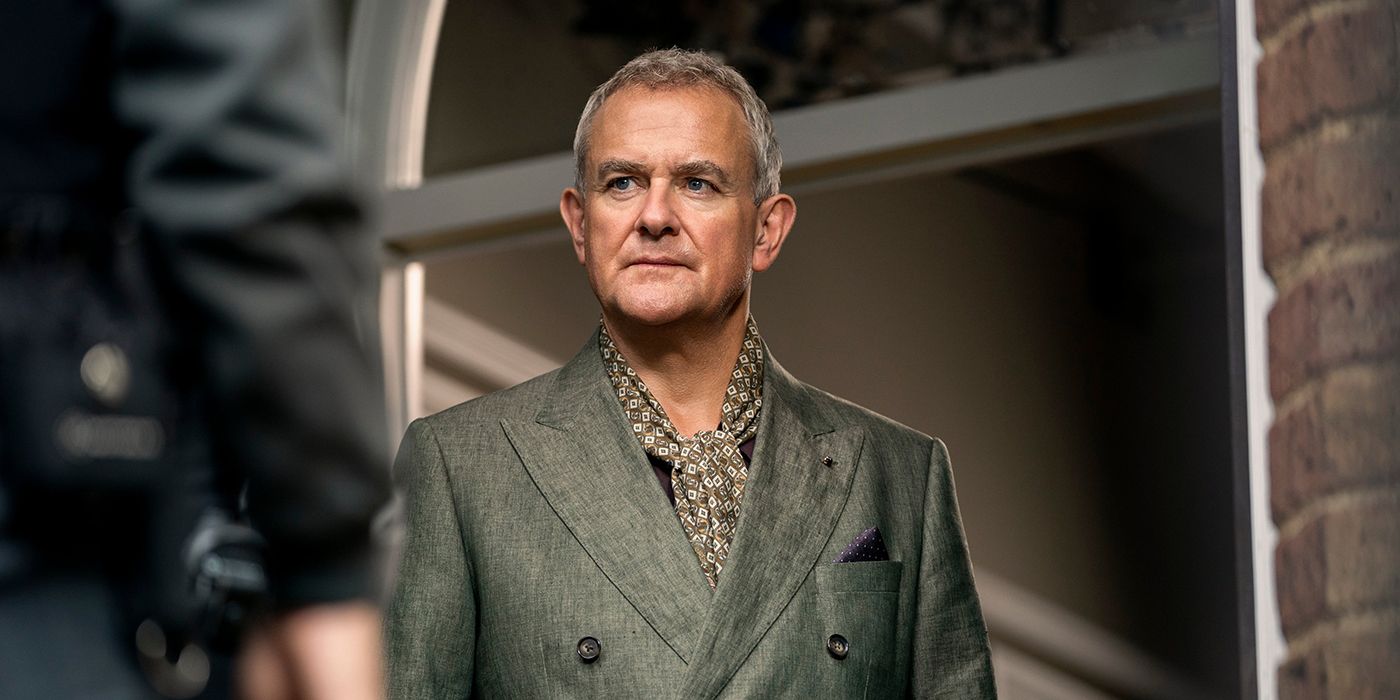This Netflix Thriller Is a Sinister Cat-and-Mouse Game You Can’t Look Away From
Though Netflix has been churning out hit-or-miss thrillers over recent years, it delivered a particularly deadly cat-and-mouse chase in 2022. Except here, there are three different rugrat tabbies and a suit-donned mouse with secrets hidden in its basement. Director Babak Anvari follows up his raw Under the Shadows and jarring Wounds with a tense and unpredictable piece that keeps us gripping the edge of our seats. I Came By succeeds in its measured portrayal of a serial killer, cruising in the wake of Hugh Bonneville‘s stately grandeur and ominous twists as a well-respected judge, Hector Blake. While the film begins as a typical scurry into the theme of “not knowing what happens behind closed doors,” it quickly turns its heel into a more interesting and thrilling social commentary on how powerful people can get away with anything.
‘I Came By’ Quickly Becomes Unpredictable
I Came By opens up in Toby’s (George MacKay, known for his role in 1917) POV, a socially conscious graffiti artist who leaves his tag of “I Came By” in the houses of the elite. We can deduce that the reason for doing so is to make the residents feel like they are still vulnerable to the socioeconomic environment outside, and thus, the private location of these tags becomes ironically notorious in the newspapers. We spend some time watching Toby try to convince his partner, Jay (Percelle Ascott), to do one last mission together, with the target being Hector Blake, a judge renowned for his charitable work with immigrants but condemned by Toby for owning illegal ivory antiques. However, as a soon-to-be father, Jay is trying to clean up his act and refuses (he also believes owning ivory isn’t a despicable enough of an act for him to potentially endanger his life), leaving Toby to creep into Hector’s mansion alone, only to discover a terrible secret in the basement.
At this point in the film, we are lulled into a familiar rhythm, probably recognizing the hints that led us to the outrageous plot twist of Don’t Breathe. As such, we immediately recognize Hector as someone we wouldn’t want to mess with, but we aren’t prepared for the first act twist. With Toby squarely placed in the forefront as the main character, we gradually empathize with his crusade for (sometimes petty) social injustice and identify with his contentious relationship with his mother, Lizzie (Kelly MacDonald). So, when he finds a bound and bruised prisoner in Blake’s basement and returns to the house on another night to free him, we wonder how we are not even halfway through the film. I Came By quickly upends any expectations we had for the film, immediately ending Toby’s life with a solid blow to the back of his head. The story continues to twist and turn, diving into unanticipated places and being merciless about who survives and who doesn’t, leaving Hector looming over it all with a murderous gleam in his charitable eyes.
The Realism in ‘I Came By’ Creates a Tense Atmosphere
Though the plot itself is not necessarily believable, there are undercurrents of chilling realism that become striking and effective. Between the pockets of calculating and succinct violence are slower-paced and almost mundane sequences of the reactions of loved ones. As soon as Toby disappears, Lizzie contacts Jay in hopes of discovering his whereabouts, only to resort to visiting the police station. The underrated MacDonald delivers a heartfelt and desperate performance here; her frustration about not being taken seriously and her concern for her son resonate with us. Though she and Toby have a typical teenage-mother relationship, there is still something troubling about watching Lizzie find secret compartments in her son’s drawers, wondering if she ever knew him at all.
Once she does reach the police station, though the acts themselves aren’t particularly realistic, we are met with a timeless story of the public feeling failed by the law. There is a well-worn display of initial police indifference, as Lizzie’s complaints are dutifully filed, but she is immediately dismissed with placating remarks rather than any real concern. Though detective Ella (Franc Ashman) does connect the missing person report to the strange 911 call from Hector’s house, it is the office’s treatment of Lizzie that becomes realistically sullen, offering limited compassion or hope. It is what leads Lizzie to conduct her own investigation, as her resolve deepens and her concern for her son wins over any logical stream of thought. This depicts how a history of social injustice mixed with such callous treatment leads to people operating out of the bounds of legality, and thus resulting in devastating consequences in this particular case.
Related
This Brilliant Crime Thriller Is an Overlooked Gem Worthy of Your Attention
This underrated thriller was released during one of cinema’s pivotal years and ultimately, got lost in the shuffle.
When Ella does meticulously scour over Hector’s mansion, she incredulously finds no evidence of abduction or murder in Hector’s basement, despite stumbling upon the secret rooms. When she tries to arrest him for having these hidden compartments and accusations, a mere phone call to his dear friend in high places hastily releases him. From having the foresight to sanitize and incinerate all evidence of his crime to being able to use his privilege as a get out of jail for free card, Hector becomes a slimy and unnerving possibility of how wealth can be used. The film becomes a hyperbole about how people in positions of power are able to skirt around the law, even with the public eye trained on them. The fact that his charities revolve around immigration, and his victims of choice are immigrants, is yet another exaggeration of hypocrisy frequently seen in elite circles. Alongside the unbearable tension of watching a realistic police investigation take place is the dramatic reiteration of political and social power that is seen in real life.
Hugh Bonneville Is a Chilling Serial Killer in ‘I Came By’
Of course, none of this could be conveyed if it weren’t for the stellar performance by Bonneville, who steals the show with his daring charisma that fluidly shifts into something more sinister. Bonneville would feel particularly at home in this high-class role after his major role in the Downton Abbey period drama as Robert Crawley. As Robert, he is protective of his family and adheres to tradition, which translates to his role in I Came By, albeit in a twisted way. Hector is naturally fiercely protective of his secrets and his reputation, which allows him to work freely, and on top of this, he embodies the traditional picture of the elite exploiting his resources and the masses for the worse. Beneath his stately grandeur, which Bonneville inherently borrows from his previous character, he also has the opportunity to imbue malevolence into his performance.
Every time he interacts with someone, Hector seems so painfully normal; it is jarring to reconcile him with the depravity he engages with. From news broadcasts where his charming smile and charitable words capture everyone’s attention to his disarming conversations with the police officers, where he manages to placate their suspicions with an innocent eye, there is something markedly winning about Hector. His split in demeanor is particularly highlighted in his monologue when he tries to entrap another asylum seeker. He talks about how his father abandoned him and his mother to pursue a relationship with someone who was an immigrant, starting the story in a charming and wistful way that gradually devolved into an unsettling spite. Undertones of bitter rage and sadism sweep beneath his words, booming throughout the room in a wicked symphony of pomp and psychopathy.
Though it could be said that Bonneville’s acting prowess overshadows the rest of the cast, his dominant presence actually adds to the social exploration of I Came By. Compared to Hector, Toby is reduced to a naive and one-dimensional character, touting the tired personality trait of enacting social justice in order to stifle his own insecurities. However, this adds to the effect of his simplistic and wide-eyed world view, suggesting that though he dealt in kneading out the vulnerabilities of the privileged, he himself didn’t necessarily comprehend just how powerful the world he antagonized was. His tags are suddenly rendered fleeting and obsolete, simply hollow gestures that cannot stand up against the deep roots the elite has in society. As such, with Hector’s shadow domineering over the film, it offers a bleak portrayal of meaningless attempts to alleviate social inequalities.
‘I Came By’ Uses Realism to Highlight Social Injustice
Apart from Bonnevile, the most memorable and distinct aspect of I Came By is its shifting POVs, as each character is out-manoeuvered and expelled by Hector, forcing another character to take the former’s place. The film strips us of the comfort of a “hero” or a “chosen one,” and instead reflects the pitiless reality of how many serial killers manage to evade detection for so long. Characters become disposable in I Came By, though each gets us closer to Hector’s retribution before becoming his next victim. It adds to the chess-like feel of the movie, as strategies and valiant impulses pick away at the impenetrable barrier surrounding Hector, but sacrifices are necessary in the larger raging war against him. So the next protagonist takes up the mantle and uses their own methods to face-off against the culpable judge, accomplishing as much as they can until their inevitable doom (which they don’t expect, since no one really anticipates their own death).
With the protagonist of the film becoming so flexible, it becomes even more damning that Hector remains standing for so long, simply because he has the resources to back his activities and the willingness and capacity to cross lines without facing dire consequences. Realism pours into this aspect of the story as it doesn’t use the narrative devices of “punishing” and “rewarding” certain behaviors and ethics. Instead, it is a bleak outlook on how unfair advantages that are generally out of people’s control chalk up the wins and losses of a battle. Hector has the home advantage, the cash backing him, a vice-like grip on the law and an overarching disdain for human life that allows him to essentially operate with impunity — picking off his trifling enemies one-by-one almost contemptuously. Once again, the film exhibits a dramatic re-enactment of the exploitation of the masses, as they become a replaceable part of an overarching system, with elite figures like Hector pulling the strings.
Social injustice pervades every corner of this deliberately paced film, from the violent outbursts to the tantalizing pressure that continually builds. Even when the three cats try and hunt down the mouse, the tension and stress caves-in around them, unable to infiltrate the suave stronghold of wealth surrounding the mouse. Building in intensity, Anvari finally rewards our patience when the cathartic final act rolls around. Yet however gratifying the ending is, with all the lives lost, we are left with the haunting question of who the real winner here is. Which matters more: taking down the enemy or the losses along the way? As such, I Came By uses distinctive strokes of realism and unpredictability to create a captivating mural of social injustice, further criticizing how privilege becomes the perfect cover.
I Came By is currently available to stream on Netflix in the U.S.
WATCH ON NETFLIX
Source link




